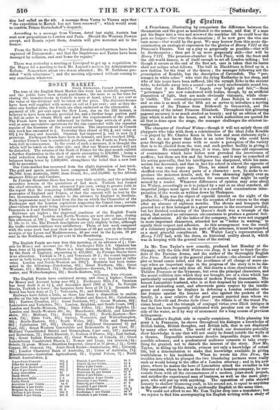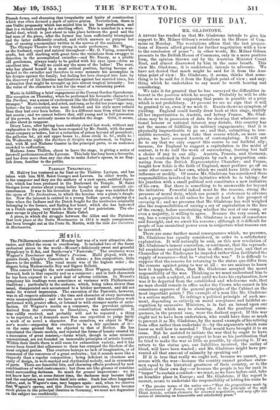In Mr. Tom Taylor's new comedy, produced last Monday at
the Olympic, with the title Still Waters run .Deep, it is easy to trace the stu- dent of the Parisian drama, and the author of the thoroughly English Nice Firm. Not only is the general plan of action—the absence of under- plot or broad comio relief, and the avoidance of all change of scene ex- cept when an important stage in the progress of the story is to be dis- tinctly marked,—not only does all this denote a close observation of the Theatre Francais or the Gymnase, but even the principal characters, and the moral collision into which they are brought, are of a class which has particularly occupied the attention of modern French dramatists. The honest Lancashire husband, who is at first despised by his romantic wife and her misleading aunt, and afterwards gains respect by the intelli. gence and courage he displays in defeating a London swindler who has designs against the honour and also against the pockets of the family, is a near relative of the good prosaic married man whom we find in Gabrielle and Brutus Male Cesar: the villain is of the truest Pa- risian breed ; and the triumph of conjugal virtue over illicit intrigue hi one that has been frequently celebrated with peculiar zest on the other side of the water, as if by way of atonement for a long course of previous delinquency. The author's English side is equally auspicious. While planning his story a la Francais.), he shows throughout his dialogue a knowledge of British habits, British thoughts, and British talk, that is not displayed by many other writers. The world of which our dramatists generally show knowledge is one that will not easily be found outside the walls of a theatre. Impossible miscreants deceive impossible dupes with im- possible schemes; and a goodnatured audience consents to take every- thing for granted, not to disturb the interest of the story. Now Mr, Taylor, in filling up his details, evinces not only a knowledge of actual life, but a determination to make that knowledge available in giving truthfulness to his incidents. When he wrote his Nice Firm, the troubles into which he plunged the two blundering partners were really such as would belong to the office of a London attorney ; and in his new piece, where he makes the hero of Lancashire attack the swindler in his City sanctum, where he sits as the director of a humbug company, he sur- rounds them with all the circumstances of a modern joint-stock project, and satisfies the experienced man of business, as well as the mere play- goer, who will put up with anything. The opposition of calm shrewd honesty to shallow blustering craft, in his second act, is equal to anything in the Mirada of Balzae, and is profoundly English at the same time. We could not afford to see Mr. Tom Taylor drop into a translator ; but we rejoice to find him accompanying his English writing with a study of
French forms, and shunning that irregularity and laxity of construction which was often deemed a mark of native genius. Nevertheless, there is one Gallic propensity which has misled him in his last production, and that is a violent craving for a startling effect This is manifest in a won- derful duel, which is just about to take place between the good and the bad man of the piece, after the former has been sufficiently triumphant and the latter sufficiently crushed, and which answers no purpose but that of causing &momentary twitter in the nerves of the audience.
The Olympic Theatre is very strong in male performers. Mr. Wigan, as the husband, equal and natural throughout—Mr. G. Vining, somewhat crudj but still marking with great force the variations from swagger to dejection in the accomplished swindler—and Mr. Emery, as a pliable old gentleman, always ready to be gulled with his eyes open—form an excellent trio. Would we could say the same of the ladies ! The aunt, who has placed herself in a most critical position, having become at- tached to the swindler and therefore in some measure his accomplice in his designs against the family, but fooling her love changed into hate by the discovery of his libertine machinations against her married niece, has a situation that might be wrought up into almost tragical intensity; but the value of the character is lost for the want of a sustaining power.



























 Previous page
Previous page